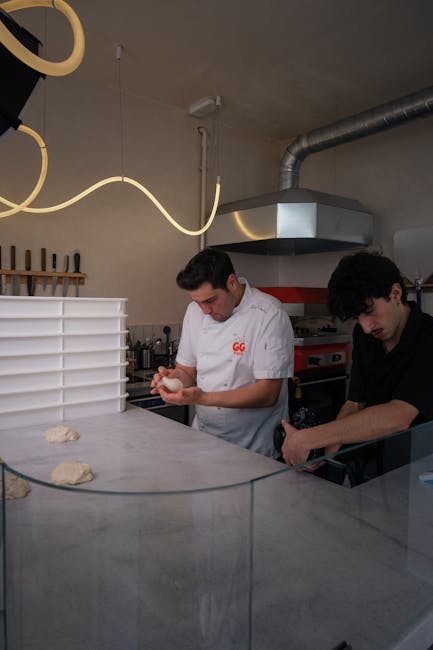Skilled Bakery Chefs for GCC Food Chains
The Growing Demand for Bakery Chefs in GCC Countries
Firstly, the GCC bakery market demonstrates remarkable expansion. According to recent industry analysis, the sector shows consistent annual growth. Additionally, international food chains continue expanding across the region. Therefore, competition for qualified bakery chefs has never been fiercer. Furthermore, consumer expectations have dramatically shifted toward premium experiences. For example, customers now seek authentic sourdough, European pastries, and innovative dietary options. Consequently, food chains must prioritize culinary excellence to maintain market relevance.
Meanwhile, local talent development still tries to meet industry demands. However, specialized training programs remain limited across the region. Thus, many employers actively recruit internationally. According to food industry authorities, global mobility for culinary professionals has increased significantly. Ultimately, successful recruitment requires understanding both market dynamics and candidate motivations.
Essential Skills for Bakery Chefs in Food Chain Environments
Secondly, identifying the right skill combination proves crucial for food chain success. Unlike standalone bakeries, chain environments demand unique competencies. Specifically, chefs must balance creativity with consistency and scalability.
Technical Baking Expertise and Innovation
Primarily, masters of fermentation, dough development, and baking techniques remain invaluable. Moreover, knowledge of diverse flour types, hydration levels, and temperature control separates adequate bakers from exceptional ones. Additionally, innovation skills drive menu development and differentiation. For instance, creating gluten-free or keto-friendly options attracts health-conscious consumers. Furthermore, understanding equipment scalability ensures product consistency across multiple locations.
Operational Efficiency and Consistency Management
Conversely, artistic talent alone cannot guarantee success in chain operations. Instead, chefs must implement standardized processes and quality controls. Similarly, waste reduction and inventory management skills significantly impact profitability. Therefore, ideal candidates demonstrate both creative and operational capabilities. According to industry research, operational efficiency improves profit margins by up to 25%.
Effective Recruitment Strategies for Bakery Talent
Thirdly, attracting top bakery chefs requires strategic approaches. Traditional job postings often fail to reach passive candidates. Instead, targeted methods yield better results.
Building Partnerships with Culinary Institutions
Specifically, collaborating with international culinary schools creates talent pipelines. For example, partnerships with Le Cordon Bleu or CIA provide access to graduating chefs. Additionally, offering internships and apprenticeships builds early relationships. Meanwhile, sponsoring work visas for international talent expands candidate pools significantly.
Competitive Compensation and Benefits Packages
Moreover, remuneration remains a primary consideration for culinary professionals. However, beyond salary, chefs value opportunities for creativity and career advancement. Therefore, packages should include:
- Tax-free income with housing allowances
- Annual return flights to home countries
- Professional development budgets
- Performance-based bonuses
- Recipe development ownership rights
Consequently, comprehensive benefits enhance attraction and retention simultaneously.
Training and Development for Bakery Teams
Fourthly, investing in continuous development ensures long-term success. Even experienced chefs require adaptation to chain operations. Furthermore, cross-training strengthens overall team capabilities.
Technical Skill Enhancement Programs
Specifically, regular workshops on new techniques keep skills current. For instance, sessions on laminated doughs or decorative elements maintain competitive advantage. Additionally, supplier-led training on ingredient functionality improves product quality. Moreover, training resources help structure effective development programs.
Leadership and Management Training
Similarly, preparing chefs for supervisory roles supports organizational growth. For example, teaching inventory management, scheduling, and team motivation creates future leaders. Therefore, development paths should include both technical and managerial components.
Retention Strategies for Skilled Bakery Chefs
Fifthly, retaining top talent reduces recruitment costs and maintains consistency. However, culinary professionals frequently seek new challenges. Thus, creating engaging environments proves essential.
Career Progression Pathways
Clearly defined advancement opportunities encourage long-term commitment. For instance, hierarchies from commis to executive baker provide measurable milestones. Additionally, cross-functional movement into R&D or corporate roles diversifies experiences.
Creative Autonomy and Recognition
Furthermore, chefs thrive when their creativity receives appreciation. Specifically, featuring signature creations on menus with chef recognition boosts morale. Meanwhile, participating in industry competitions builds prestige. Consequently, recognition programs significantly impact retention rates.
Leveraging Technology in Bakery Operations
Modern bakery operations increasingly integrate technology. For example, automated proofing systems and recipe management software enhance consistency. Additionally, data analytics optimize production schedules and ingredient ordering.
According to agricultural research, technology adoption improves yield consistency by up to 30%. Therefore, chefs comfortable with digital tools provide greater value. Moreover, online training platforms facilitate skill development across multiple locations.
Cultural Adaptation for International Bakery Chefs
Finally, successful integration of international chefs requires cultural sensitivity. GCC markets have distinct preferences and traditions. Thus, understanding local tastes ensures product relevance.
For example, dates, saffron, and cardamom often feature in localized products. Additionally, holiday periods like Ramadan and Eid create specific demand patterns. Therefore, cultural training accelerates effectiveness and market alignment.
FAQ: Skilled Bakery Chefs for GCC Food Chains
What qualifications should I look for in bakery chefs for food chains?
Look for formal culinary education plus significant experience in high-volume environments. Additionally, seek chefs with innovation skills and consistency management abilities.
How can I attract skilled bakery chefs to the GCC region?
Offer competitive tax-free packages, career development opportunities, and creative autonomy. Additionally, provide relocation support and housing allowances.
What are the biggest challenges in retaining bakery talent?
Chefs often seek new creative challenges. Counter this by offering menu development opportunities, continued education, and clear advancement pathways.
How important are cultural adaptation skills for bakery chefs?
Extremely important. Understanding local tastes and traditions ensures product relevance and market success in GCC countries.
What role does technology play in modern bakery operations?
Technology ensures consistency, optimizes production, and reduces waste. Bakery chefs should be comfortable with recipe management software and automated equipment.
Conclusion: Investing in Bakery Excellence
In conclusion, securing skilled bakery chefs for GCC food chains requires strategic approaches to recruitment, development, and retention. Ultimately, culinary talent directly impacts customer satisfaction and profitability. Therefore, prioritize comprehensive strategies that address both technical skills and cultural adaptation. Finally, remember that ongoing investment in your bakery team delivers exponential returns. Ready to transform your bakery operations? Contact us for personalized recruitment solutions or schedule a consultation to discuss your specific needs.




